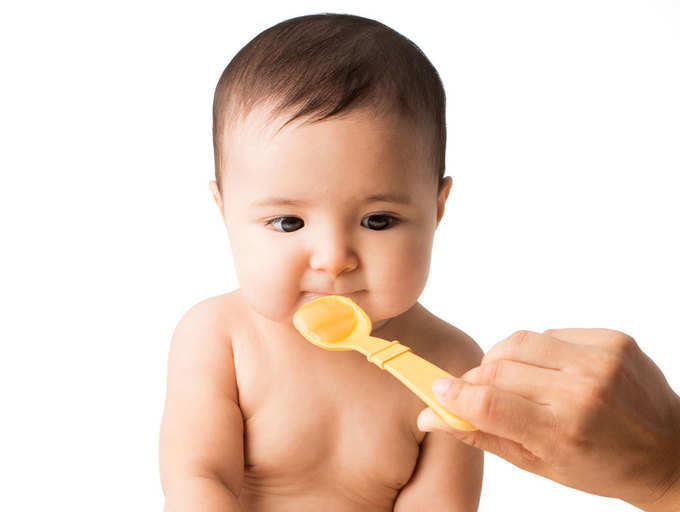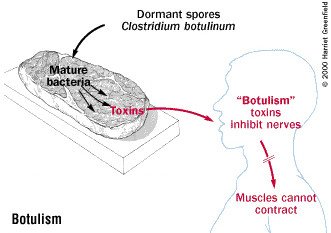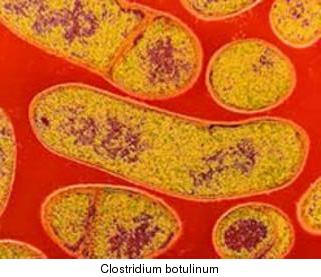botulism in babies timeline
Difficulty swallowing Muscle weakness Double vision Drooping eyelids Blurry vision Slurred speech Difficulty breathing Difficulty moving the eyes. Children under 12 months are also at a heightened risk of developing botulism.

Is Your Baby Constipated Babycenter
These bacteria are harmless to older kids and adults.

. Causes of Infant Botulism Babies can get. Between the time of infection until the onset of paralysis is symptoms of the disease-free period ranges from a few days up to 3- 4 weeks. Infant botulism results from the ingestion of the C.
Please report any suspect infant botulism case to your local health jurisdiction through appropriate channels. About 100 babies a year in the United States will develop infant botulism. Infant botulism is an intestinal toxemia.
It was named after the Latin word for sausage botulus. Infant botulism usually affects babies who are 3 weeks to 6 months old. Botulinum antitoxin also known as botulism antitoxin is comprised of antibodies or antibody antigen-binding fragments that block the neurotoxin produced by the bacterial species Clostridium botulinum.
Most babies who contract infant botulism are younger than six months old and all are younger than 12 months old. It can affect babies up to age 1 but is most common between three weeks and six months. In infants younger than 1 year of age the dose is 10 of the adult dose with a starting infusion rate of 001 mLkg per minute.
About 90 percent of infants with botulism are younger than. Title 17 California Code of Regulations CCR 2500 2593 26415-264320 and 2800-2812 requires that healthcare providers report known or suspected cases of infant botulism to the jurisdiction in which the patient resides. Botulinum spores which germinate into bacteria that colonize in the gut and release toxins.
To protect your baby from infant botulism avoid exposure. Paralysis occurs in all four limbs generally starts in the distal part of the leg and then spread to proximal to the arms neck and face. Botulinum spores and subsequent colonization of the small intestine.
Infant botulism is a rare but serious gastrointestinal condition caused by exposure to Clostridium botulinum C. Before their first birthday their digestive system has not become developed enough to handle the bacteria. All cases of botulism must be reported to the Health Protection Agency HPA so that action can be taken.
It occurs in all racial and. The disease is caused by neurotoxic proteins so poisonous that one-millionth of a. Though infant botulism can be treated it is important to get medical care as soon as possible.
Signs and symptoms might include. Infant botulism usually affects babies between 3 weeks and 6 months old but all babies are at risk until their first birthday. About 90 percent of infants with botulism are younger than.
Infant botulism most commonly affects babies 3 weeks to 6 months old but babies are at risk until they are 1 year old. Most babies respond quickly to treatment and they should be well enough to leave hospital within two-and-a-half weeks. Signs and Symptoms of Botulism in Babies Symptoms of botulism begin between three to 30 days after an infant ingests the spores.
Different from foodborne botulism caused by ingestion of pre-formed toxins in food it occurs when infants ingest C. About 90 percent of botulism cases occur in infants younger than 6 months old. Babies are at risk of infant botulism until they reach about 1 year of age.
The condition can occur in infants up to age 12 months. For this reason most pediatricians recommend that parents and care-givers avoid giving honey and processed foods containing honey to children until they are 1 year old. Children under 12 months are also at a.
Bacteria from the spores can grow and multiply in a babys intestines producing a dangerous toxin. Infant botulism occurs mostly in infants under 6 months of age. In most adults and children older than about 6 months this would not happen because.
Infant botulism usually affects babies who are 3 weeks to 6 months old. It can affect babies up to age 1 but is most common between three weeks and six months. The neurotoxin binds to cholinergic nerve terminals and cleaves intracellular proteins necessary for acetylcholine release resulting in bulbar.
Any paralysis may last a few weeks but babies grow new nerve endings so they should make a full recovery. Clostridium botulinum lives in the soil so as with nitrates high risk foods include potatoes carrots beets squash spinach and green beans. The bacteria exists in two forms.
Infants who acquire botulism range in age from six weeks to nine months with the peak incidence occurring at two to three months of age. Thats because their mature digestive systems can move the toxins through the body before they cause harm. Active bacteria which make the botulinum toxin and spores an inactive form surrounded by a tough shell.
What is infant botulism IB. Mean age of onset is 13 weeks with a range from 1 to 63 weeks. Infants are susceptible to infant botulism in the first year of life with more than 90 of cases occurring in infants younger than six months.
All types of botulism can be fatal and are considered medical emergencies. This most common form of botulism begins after Clostridium botulinum bacterial spores grow in a babys intestinal tract. Babies are at risk of infant botulism until they reach about 1 year of age.
It typically occurs in babies between the ages of 2 months and 8 months. These botulism deathswidely publicized in mainstream media outletsthreatened to undermine the still-shaky foundation of the canned food business fueling consumers deepest fears about. Infant botulism most commonly affects babies 3 weeks to 6 months old but babies are at risk until they are 1 year old.
Boiling food for 10 minutes will usually kill active. The disease results after spores of the bacterium Clostridium botulinum or related species are swallowed temporarily colonize an infants large intestine and produce botulinum neurotoxin.

Baby Teeth Frequently Asked Questions Parents

Cdc Alert Several Babies In Texas Have Become Ill With Infant Botulism After Using Honey Pacifiers Because Honey Can Contain Germs That Cause Infant Botulism Never Give Honey Or Products Made

What Parents Need To Know About Botulism

How To Start Your Baby On Solids An Infographic Smart Nutrition With Jessica Penner Rd Baby Food Chart Baby Food Recipes Smart Nutrition

Lizzie O Connor Ms Rd On Instagram A Baby Younger Than One Can Get Botulism By Eating Clostridium Botulinum Spores Foun Honey Clostridium Botulinum Spore

Four Infants Hospitalized For Botulism After Using Pacifier Funny Pictures For Kids Pacifier Infant

From Milk To Solids Baby Food Guidelines For The First Year Baby Food Timeline Baby Food Chart Baby Food By Age

What Parents Need To Know About Botulism

Babydoc Club Uk New Parents Did You Know Sweet Honey Can Be Harmful For Baby Yes It S Yummy In Porridge But Has Been Linked To Rare But Serious Infant Botulism The

Alert Honey Should Not Be Feb To Infant Under 12 Months Cause It Contains Spores Of A Bacterium Called Clostri Kids Health Baby Health Clostridium Botulinum
A Breastfeeding Story Breastfeeding Through Infant Botulism

What Happens If You Give Honey To Baby Why Should You Not Give Honey To Babies

Choosing And Caring For Your Baby S Pacifier Babycenter

The Worst Foods For Babies Babycenter

Kids Eat In Color Ever Wondered Why Kids Can T Have Honey Until 1 Here S The Answer This Rule Was So Annoying To Me Because No One Ever Explains Why

Botulism Guide Causes Symptoms And Treatment Options

Welcome To The Infant Botulism Treatment And Prevention Program

